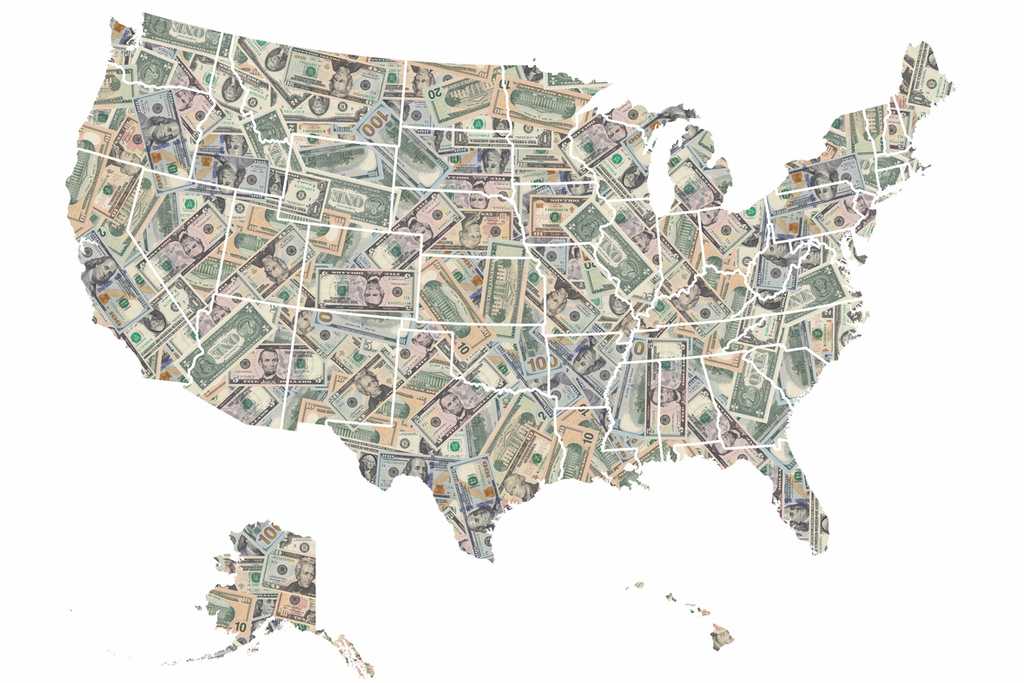Making sure you can afford the type of retirement you worked hard to enjoy is probably the most imperative piece of the retirement – and taxes are a big part of the puzzle.
Taxes can be a major drag on your disposable income, even in retirement. In fact, most retirement income is subject to taxes, with the exception of some Social Security benefits and any Roth retirement accounts.
Retirees whose only source of income is Social Security don't pay federal income taxes. But most retirees have income from multiple sources — including investments and retirement-account distributions — and there’s a potential to be taxed on up to 85% of their Social Security benefits, depending on the state you live in.
Some states with low or no income taxes may have higher property or sales taxes. For example, while Illinois does not tax retirement income, it has one of the highest sales and property taxes in the U.S. – eating into some of the tax benefit you get from not having your Social Security taxed.
With all those inputs, and help from Kiplinger.com, the following is a list of the top 10 tax-friendly states for retirees.
#10 – Texas
Texas has no state income tax or estate and inheritance tax. On the other hand, it has above average property tax rates, and local tax rates may be higher than in cities in other states.
- State Income tax range: None
- Average state and local sales tax: 8.19%
- Property tax rate: $1692 per $100,000 of assessed property
- Social Security Tax: None
- Tax distributions from 401(k) plans, IRAs or pensions: Included as part of income.
- Estate or Inheritance Tax: none
#9 - Florida
For retirees, Florida has no state income tax, no estate or inheritance tax, and an average state and local sales tax of 7.08 percent. Property tax rates are about average compared nationwide.
- State Income tax range: None
- Average state and local sales tax: 7.08%
- Property tax rate: $830 per $100,000 of assessed property
- Social Security Tax: None
- Tax distributions from 401(k) plans, IRAs or pensions: None
- Estate or Inheritance Tax: None
#8 – New Hampshire
For retirees, New Hampshire is a great state for retirees because residents don’t pay state income taxes, state and local sales taxes, and they don’t pay estate or inheritance taxes. The big drawback is New Hampshire has some of the highest property tax rates in the country.
- State Income tax range: None
- Average state and local sales tax: None. But there's a 5% tax on dividends and interest in excess of $2,400 for individuals ($4,800 for joint filers).
- Property tax rate: $2050 per $100,000 of assessed property
- Social Security Tax: None
- Tax distributions from 401(k) plans, IRAs or pensions: None
- Estate or Inheritance Tax: None
#7 – South Dakota
South Dakota doesn't impose an income tax, so Social Security benefits and other forms of retirement income are also tax free. Like Texas, what keeps South Dakota from rising higher on the list, is higher than average property tax rates (although there are some specific breaks for seniors).
- State Income tax range: None
- Average state and local sales tax: 6.4%%
- Property tax rate: $1219 per $100,000 of assessed property
- Social Security Tax: None
- Tax distributions from 401(k) plans, IRAs or pensions: Included as part of income.
- Estate or Inheritance Tax: None
#6 - Arkansas
Arkansas does have a state income tax, but they are comparatively low to the national average and are structured in a way that favors retirees with lower incomes. Social security is tax free, and estates and inheritances are also tax free.
- State Income tax range: 0.75% (on taxable income up to $4,499 for taxpayers with net income from $22,200 to $79,300) to 6.6% (on taxable income over $79,300 for taxpayers with net income above $79,300)
- Average state and local sales tax: 9.51%
- Property tax rate: $612 per $100,000 of assessed property
- Social Security Tax: None
- Tax distributions from 401(k) plans, IRAs or pensions: Included as part of income.
- Estate or Inheritance Tax: None
#5 - Tennessee
Retirees in Tennessee have a low overall tax burden. The state has no income tax. (It had a tax on stock dividends and interest income from bonds and other investments before 2021 - the rate was 1% in 2020.) Property taxes are well below average, too. The state also offers some property tax relief programs for income-qualified senior citizens. The only drawback is one of the highest combined state and local tax rates in the nation.
- State Income tax range: None, but only 1% on interest and dividends.
- Average state and local sales tax: 9.55%
- Property tax rate: $636 per $100,000 of assessed property
- Social Security Tax: None
- Tax distributions from 401(k) plans, IRAs or pensions: none.
- Estate or Inheritance Tax: None
#4 – Delaware
With no sales tax, low property taxes, and no death taxes Delaware is essentially a tax haven for retirees. The only negative is the 6.6% income tax rate, which is more of an issue for higher income families. Overall, though, the income tax rates are comparatively reasonable, and residents age 60 and older can exclude up to $12,500 of pension and other retirement income (including dividends and interest, capital gains, IRA and 401(k) distributions, etc.).
- State Income tax range: 2.2% (on taxable income from $2,001 to $5,000) — 6.6% (on taxable income above $60,000).
- Average state and local sales tax: None.
- Property tax rate: $562 per $100,000 of assessed property
- Social Security Tax: None
- Tax distributions from 401(k) plans, IRAs or pensions: None
- Estate or Inheritance Tax: None
#3 - Nevada
Nevada is very attractive to retirees as there is no state income, nor estate or inheritance taxes. While the state does have some of the higher state and local sales taxes, the property tax rate is on the low side.
- State Income tax range: None
- Average state and local sales tax: 8.23%
- Property tax rate: $533 per $100,000 of assessed property
- Social Security Tax: None
- Tax distributions from 401(k) plans, IRAs or pensions: Included as part of income.
- Estate or Inheritance Tax: None
#2 - Alaska
Alaska doesn’t have a state income tax, nor, estate tax or inheritance tax. It also has the second-lowest average state and local sales tax of 1.78 percent. Alaska is considered one of the most elder-friendly work market for retirees who might want to earn extra income. The state has the highest percentage of workers who are 65 years old or older. One unique perk if you live in Alaska — the state sends all permanent residents (who have lived there for at least one year) an annual dividend check from its oil wealth savings account.
- State Income tax range: None
- Average state and local sales tax: 1.76
- Property tax rate: $1182 per $100,000 of assessed property
- Social Security Tax: None
- Tax distributions from 401(k) plans, IRAs or pensions: None
- Estate or Inheritance Tax: None
#1 - Wyoming
For taxes, Wyoming is the best choice for retirees. There is zero income, estate and inheritance taxes. In addition, the state, local sales and property taxes are some of the lowest in the country.
- State Income tax range: None
- Average state and local sales tax: 5.33%
- Property tax rate: $575 per $100,000 of assessed property
- Social Security Tax: None
- Tax distributions from 401(k) plans, IRAs or pensions: None.
- Estate or Inheritance Tax: None
At the end of the day, you worked hard for many years to get to the point of retirement. We all want to focus on truly enjoying these years. There are many factors that go into that enjoyment: location, recreation, intellectual activities, access to quality healthcare, weather, being near family…and the list goes one. Having enough money to live comfortably and afford the ideal lifestyle is imperative in meeting these goals. Retiring to a tax-friendly state can certainly help you stretch that retirement income for many years to come.

